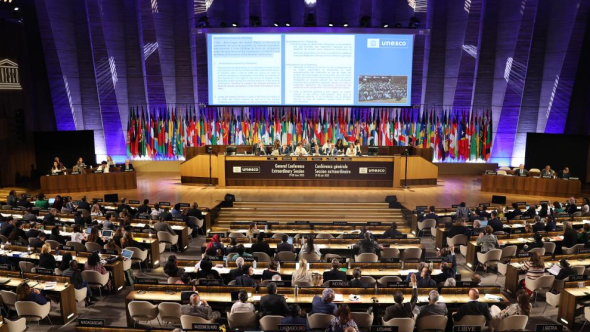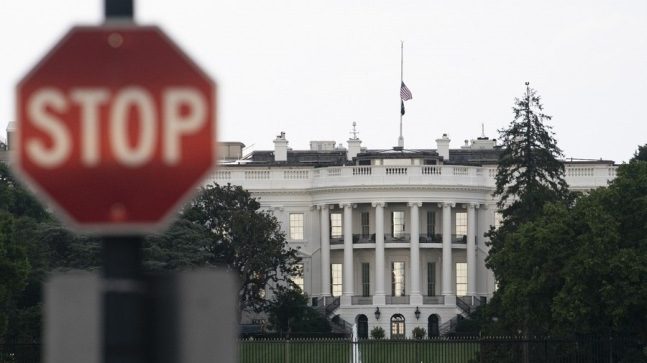
An Extraordinary Session of the General Conference of the United Nations Educational, Scientific and Cultural Organization (UNESCO) is held in Paris, France, June 30, 2023. /Xinhua
An Extraordinary Session of the General Conference of the United Nations Educational, Scientific and Cultural Organization (UNESCO) is held in Paris, France, June 30, 2023. /Xinhua
Editor's note: Wang Chuanxing, a special commentator for CGTN, is a professor at the Department of International Relations, School of Political Science and International Relations, Tongji University. Zhou Yijiang, a special commentator for CGTN, is an assistant professor at the Department of Diplomacy, School of Political Science and International Relations, Tongji University. The article reflects the authors' opinions and not necessarily the views of CGTN.
"On 25 July, the United Nations Educational, Scientific and Cultural Organization (UNESCO) celebrates the return of the United States." But does the United States really deserve "celebrating" its second-time "cherry-picking" return to UNESCO? Or whether we need to give the United States a big thumbs-up or a big thumbs-down for rejoining this agency? Here, history does matter.
As a matter of fact, the United States withdrew from this international organization on December 31, 1984, due to its disadvantages in taking UNESCO as a battlefield to compete for influence over the Union of Soviet Socialist Republics, which could be attributed to the dramatic increase of third world country members in UNESCO in those days. The United States rejoined the organization in 2003, when it found UNESCO a helpful hand in fighting against the extremists after the 9/11 terrorist attacks, saying the organization had "reformed." This is the first round of the U.S. thumbing down and thumbing up UNESCO for the purpose of its national and geopolitical interests.
Over 10 years later in 2017, the United States staged a farce to withdraw from UNESCO a second time. The United States did its utmost to oppose UNESCO's decision to accept Palestine as a formal UNESCO member, willfully undermining UNESCO by refusing to pay its annual $80 million dues to this institution since 2011, and especially arguing against the UNESCO approval of the Palestinian application of the old city of Hebron in the area under the control of the Israelis as world heritage in July 2017.
It is important to review what UNESCO is and what mission this agency is shouldered with: the history of two world wars led to a powerful vision of strengthening global solidarity through mutual understanding and cultural exchange. This vision drove the adoption of the Constitution of UNESCO in 1945, which came into force on 4 November of the following year.

The White House and a stop sign in Washington, D.C., U.S., August 4, 2022. /Xinhua
The White House and a stop sign in Washington, D.C., U.S., August 4, 2022. /Xinhua
Today, UNESCO's mission remains focused on fostering a culture of peace, promoting sustainable development, eradicating poverty, and advancing intercultural dialogue through education, science, culture, communication, and information. It plays a crucial role in conservation and preservation efforts for both natural and cultural heritage around the world, as well as in establishing global education systems and promoting access to education for people worldwide.
It is important to keep in mind the UNESCO mission to conserve and preserve "both natural and cultural heritage around the world," which is totally helpful for the world to come to know the true purpose of the United States, the world's number one quitter, to rejoin UNESCO on July 11, 2023, in a selective and utilitarian way a second time.
U.S. Secretary of State Antony Blinken has declared the narrow-minded American purpose "that the U.S. absence from UNESCO was letting China write rules on artificial intelligence, referring to the Ethics of Artificial Intelligence adopted by the agency as a framework file guiding the development of the AI industry and technology," while he forgot UNESCO's primary objective to promote international cooperation in education, sciences, culture, and communication as a means of fostering peace and stability.
The United States needs to admit that UNESCO is an agency having made significant progress in advancing science and technology, recognizing the pivotal role of scientists, diplomats, and other societal actors in science diplomacy, playing a pivotal role in fostering scientific cooperation and strengthening scientific capacity in various regions, including South-East Europe and Africa.
The U.S. should be in close collaboration with UNESCO rather than taking advantage of it as a geopolitical arena where the United States attempts to make the best of its values and its ideologies for its own narrow ends.
All in all, UNESCO aims at promoting mutual understanding and respect, building more inclusive and equitable societies, and creating a more peaceful and sustainable world, which should arouse the U.S. awareness of itself as a beginner to help formulate this agency.
(If you want to contribute and have specific expertise, please contact us at opinions@cgtn.com. Follow @thouse_opinions on Twitter to discover the latest commentaries in the CGTN Opinion Section.)